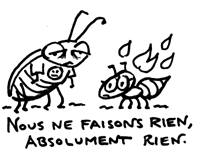Verbs
faire ‘to do,’ ‘to make’
The verb faire is irregular in the present tense.
| faire ‘to do, to make’ | |
| je fais | nous faisons |
| tu fais | vous faites |
| il/elle/on fait | ils/elles font |
| past participle : fait | |
Note the vous form faites. It is unusual because it does not end in -ez. Faire is one of only three verbs where this is the case (The others are être: vous êtes, and dire: vous dites ). You may notice, too, the similarity in the third person plural forms of aller, être, and faire:
- ils vont (they go),
- ils sont (they are), and
- ils font (they do/make).
Listen carefully to the following sentences. Although faire is often used in a question, it does not automatically have to be used in the response.
| Tex: Salut tout le monde. Qu’est-ce qu’on fait? | Tex: Hey everyone. What’s everybody doing? |
| Corey: Pas grand-chose. | Corey: Not much. |
| Fiona: Nous ne faisons rien, absolument rien. | Fiona: We’re not doing anything, absolutely nothing. |

Faire is used in many expressions, including weather, sports, and household tasks.
Listening Comprehension:
1
2
3
4
5
6
7
8
9
10
11
12

